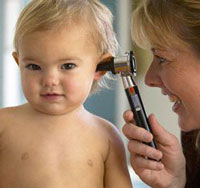 |
| Image Source: Infanthearing.org |
An infant with normal hearing should be able to do the following*:
Around two months of age:
- Startles to loud sound
- Quiets to familiar voices
- Makes vowel sounds like “ohh”
Around four months of age
- Starts babbling
- Looks for sound sources
- Makes squeals and chuckles
Around six months of age
- Turns head toward loud sounds
- Begins to imitate speech sound
- Babbles sounds like “ba-ba”
Around nine months of age
- Imitates speech sounds of others
- Understands “no-no” or “bye-bye”
- Turns head toward soft sounds
Around 12 months of age
- Correctly uses “ma-ma” or “da-da”
- Gives toy when asked
- Responds to singing or music
*Source: American Academy of Audiology




